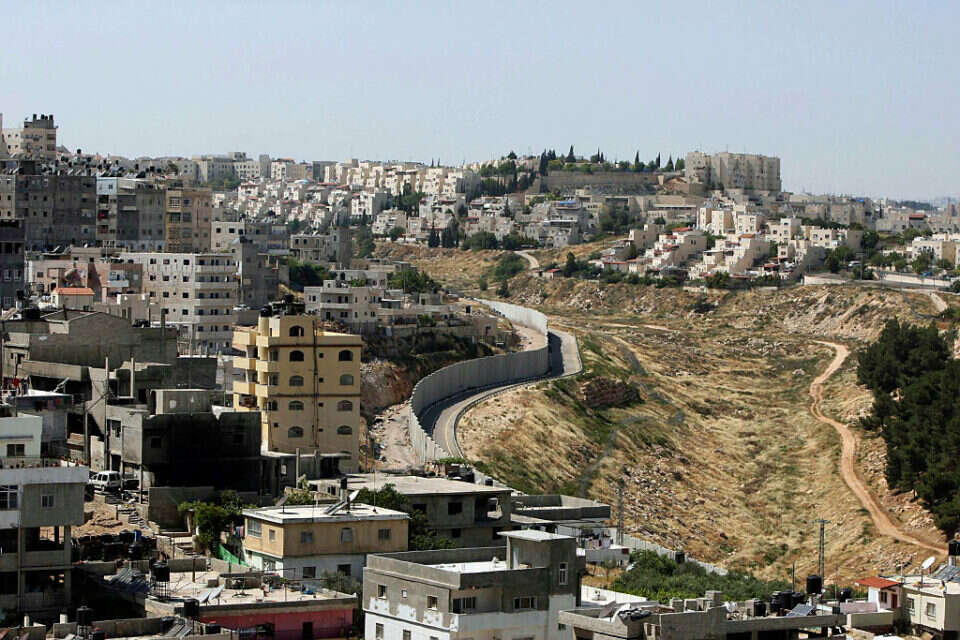In the Shoafat refugee camp and the two neighborhoods adjacent to it, Dahit Islam and Ras Khamis do not remember such a large-scale operation by Israeli security forces as the one they witnessed in the last two days from the night of the attack in which the IDF female soldier Sergeant Noa Lazar was killed.
Most of the residents in this area have blue ID cards by virtue of their status as permanent residents of Jerusalem.
However, the route where the security fence was built during the Second Intifada in the 2000s created a new problem, which turned the camp and its surroundings into a kind of no man's land.
This is an area that is within the municipal territory of Jerusalem, but geographically separated from it, and located behind the fence.
There are no exact statistics, but according to estimates, tens of thousands of residents live in the area of the camp.
What is happening in the Shoafat camp itself is very reminiscent of the reality that exists in the refugee camps in Judea and Samaria where chaos is rampant.
The place has become a hotbed of crime, along with phenomena of drugs, violence, and many hardships in all aspects of life.
Many residents live overcrowded, in inadequate conditions and dilapidated infrastructure, and frequently complain about partial services that do not meet their needs.
The scene of the attack at the Shuafat checkpoint, photo: Yoni Rikner
The camp and the neighborhoods next to it are considered an enclave, ex-territory.
At the entrance there is a barrier with entry and exit routes for vehicles and pedestrians, like those that separate Israel from the territories of Judea and Samaria.
"We demand that you take down the barrier"
"People here pay property taxes, but do not receive services like residents in the western neighborhoods of the city receive. The authorities avoid entering here. It is not just a matter of piles of garbage that are thrown in every corner. There is great neglect here," said residents in the camp.
Documentation: The police disperse disturbances in the Shuafat refugee camp // Credit: Police spokespersons
"Here next to us are the neighborhoods of Pisgat Ze'ev and the French Hill, where everything is in order, there are roads, new construction, parks, employment and leisure for young people. We have no development and nothing. We demand that you take down the barrier. Where there are soldiers and police it brings problems. Why this discrimination "Other neighborhoods in East Jerusalem have free access to the city, only here there is a barrier and separation. We don't need the fence either. Remove everything, and let the people live like human beings," Hamdi Diab, spokesman for the Fatah movement in the Shoafat refugee camp, told Israel Hayom.
A police helicopter hovered over the Shoafat refugee camp, photo: Oren Ben Hakon
Immediately after the murderous attack yesterday, fireworks of joy were seen in the sky of the camp.
"You won't find people here who will say that they condemn the attack. That day, a few hours before, there was a violent arrest of a young Palestinian woman in the Shaar Nablus area, everyone saw the video, how she was dragged on the floor and attacked. It caused pain to many people who were very angry. Harming girls and women like this is a red line for us, people cannot accept it. The attack came in response to this thing and everything you do," said Diav.
Incidents of violence and crime are not a rare sight in the camp and its surroundings.
Although you have heard that operations are being conducted to collect weapons, the area is saturated with weapons that were used during street brawls, conflicts between youths and criminals, and between clans.
"Israel can one day collect all the weapons that are in the camp, but it does not act because as long as it is not directed against it, it does not care. People here can be murdered and your forces do not go in and do nothing. You are only remembered when there is an attack."
Shoafat refugee camp, photo: Oren Ben Hakon
Many of the residents work in Israel and in Jerusalem itself.
"People want to get out easily. To get out of the checkpoint and get to work is a story. We have many residents here who work in Israel and in Jerusalem in many professions, construction, renovations, plumbing, and every day there are problems, going in and out, traffic jams and congestion, even inside the camp, how many roads are there We need to take care of all these things," Khaled Alchiali, a building contractor, resident of the Shoafat refugee camp, told Israel Hayom.
It should be noted that the lack of governance in the Jerusalem neighborhoods beyond the fence, and the lack of effective enforcement have massively encouraged illegal construction in recent years.
Soon, high-rise complexes overlooking the Jewish neighborhoods in the north of the city were established in the area.
The disturbing phenomenon worsens mainly in the village of Akab, which is also beyond the fence.
were we wrong
We will fix it!
If you found an error in the article, we would appreciate it if you shared it with us

